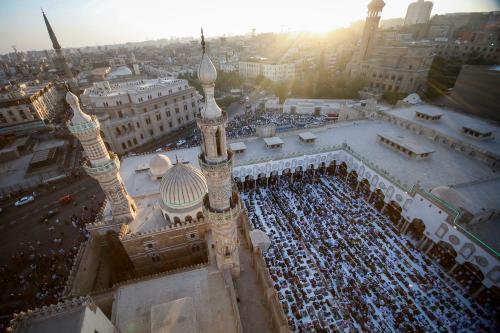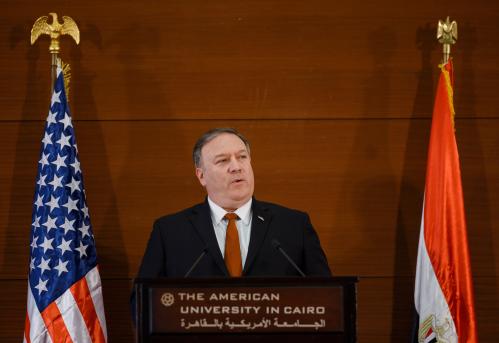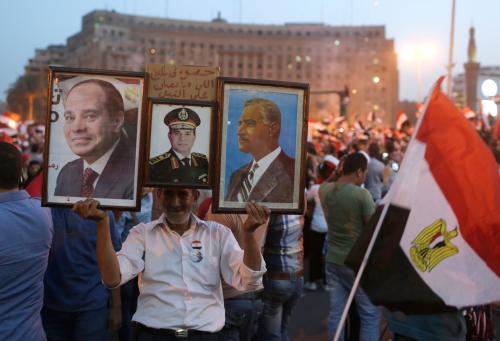What are Sufis? This was a question many were asking after at least 305 Egyptians were massacred on Friday in the Sinai. For most of Islamic history, writes Shadi Hamid, Sufism wasn’t considered as something apart. This piece originally appeared in The Atlantic.
What are Sufis? This was a question many were asking after at least 305 Egyptians were massacred on Friday in the Sinai. They were killed in an assault by Islamist militants (likely from the local Islamic State affiliate, although the group has not yet made a claim of responsibility) on Al Rawdah mosque, which is commonly described as a “Sufi mosque.” The implication is that its congregants observed a more “mystical” version of Islam, one that, for example, venerates saints. While such a description is not necessarily inaccurate—it is common to refer to mosques by their apparent ideological or spiritual orientation—like most things related to Islam, it’s a bit more complicated. Many Sufis do not self-define as Sufis, since for them, this is just how Muslims practice—and have always practiced—Islam.
For most of Islamic history, Sufism wasn’t considered as something apart. That it is today has much to do with the rise of Islamism, which is generally perceived as anti-Sufi. (Indeed, many contemporary Islamists, particularly ultra-conservative Salafis, are precisely that.) Yet, none other than Hassan al-Banna, perhaps the most preeminent Islamist of the 20th century, was initiated into the Sufi Hasafiyya order in 1923, just five years before he founded the Muslim Brotherhood. (Banna, for a time, would regularly visit the tomb of Sheikh Hasanayn al-Hasafi, the order’s namesake.) Similarly, Abdessalam Yassine, the late founder and leader of Adl Wal Ihsane, Morocco’s largest Islamist movement, was a member of the Boutchichiyya order.
To describe Sufis as “tolerant” and “pluralistic” may also be true, but doing so presupposes that non-Sufi Muslims aren’t tolerant or pluralistic. On the other hand, describing Sufis as heterodox, permissive, or otherwise less interested in ritual or Islamic law is misleading. In 2005, I lived down the street from an area of Amman called Kharabsheh, where the followers of the American convert Sheikh Nuh Keller, of the Shadhili order, lived. Here, I met some of the most strict, orthodox Muslims I’ve ever met. If, for instance, female followers of Sheikh Nuh wanted to live in Kharabsheh and take part in the community, they were required to wear the niqab, or face veil, which I initially found quite odd. Perhaps the most well-known Sufi-influenced traditionalist imam in the United States is another convert, Hamza Yusuf, who is nothing if not orthodox.
To see one group of Muslims as better means seeing other Muslims as problems to be solved.
The idea that Sufis are inherently non-violent or pacifist is similarly ahistorical. Some of the most famous Islamic rebellions were led by Sufis like Sudan’s Mohamed Ahmed, who declared himself Mahdi, or “the redeemer,” and Abdelkader in Algeria. As Abdelbasit Kassim and Jacob Zenn have noted, “During the jihadist campaigns of the 1800s in the Sahel-Sahara region, the Muslim scholars who led the armed movements identified themselves with the Sufi brotherhoods.” Some of this may have to do with the fact that someone had to lead rebellions against foreign invasions; Sufi orders were popular and enjoyed considerable legitimacy. If they didn’t take charge, who would? Still, this would only mean that the fundamental “peacefulness” of Sufis is mostly circumstantial and has little to do with opposing jihad, as such, or rejecting violence more generally. Today, in countries like Syria, some prominent Sufi sheikhs have been vocal defenders of state violence, with Ahmed Kuftaro, the grand mufti until his death in 2004, supporting the Baath regime. (Without doing so, he wouldn’t have remained grand mufti).
These are far from mere semantic discussions. They inevitably shape the subtext of so many conversations around Islam and politics. Western governments are susceptible to exoticizing Sufis and elevating them as the better, peaceful Muslims. But to see one group of Muslims as better means seeing other Muslims as problems to be solved. Westerners, most of whom have heard of Rumi’s poetry, but have little idea who the Mahdi is, will, naturally, prefer this idea of pacifist, apparently apolitical Muslims, only to find out that most Muslims are just, well, Muslims.
In this respect, the mosque that Islamist militants so brutally attacked in Egypt was something more than a Sufi mosque; it was, simply, a mosque.
The Brookings Institution is committed to quality, independence, and impact.
We are supported by a diverse array of funders. In line with our values and policies, each Brookings publication represents the sole views of its author(s).





Commentary
Misunderstanding the victims of the Sinai massacre
November 27, 2017